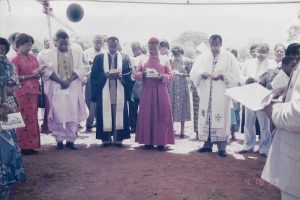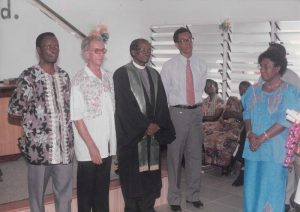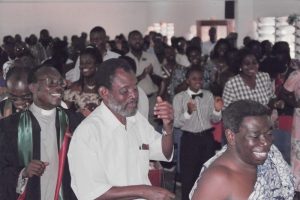Our History
In the 1970s, church services on the University of Ghana campus were held in the Hall chapels when school was in session. Whenever the university was on recess, campus residents either had to make their way into town on Sundays to worship or else put worship on hold until students returned for the next session. It seemed good to the four founding fathers (the late Prof. Alan Duthie, Rev. Joshua Kudadjie, a lay person at the time, Dr Frederick Phillips and Prof. Kwadzo Senanu) to establish a place on campus where Christians could gather together during the term as well as during the vacation. Their aim was to share fellowship and to encourage one another to put their Christian faith into action wherever they found themselves. They set out to make the exposition of the Word of God central to fellowship meetings, where the members would be taught from the Word so that its truth would fire them into action in conformity with the Word.
The four of them went from house to house in pairs, on foot, to ascertain how many campus residents would be disposed to meeting in a non-denominational setting, and to give advance notice to residents that a regular place of worship would soon be available on campus, and they would be informed when services began.
 The “Legon Residents’ Congregation” was eventually launched at Easter 1978 (just before the referendum on Union Government). When the group started meeting, offerings were not taken. Over time, some members wanted the opportunity to give their substance in worship, and so provision was made for offerings, and consequently, the fellowship was compelled to open an account.Since they needed to provide their bankers with a Constitution, among other things, they drew up an official ‘Statement Of Faith And Practices’ – a document which emphasized inter alia, the Bible as the final authority in all matters of doctrine and conduct for the fellowship, and Jesus Christ as Saviour through personal faith in His death and resurrection. The election of a Committee of Elders (COE) to run the church was also introduced. Thus began the formalisation and formation of what is now LIC.
The “Legon Residents’ Congregation” was eventually launched at Easter 1978 (just before the referendum on Union Government). When the group started meeting, offerings were not taken. Over time, some members wanted the opportunity to give their substance in worship, and so provision was made for offerings, and consequently, the fellowship was compelled to open an account.Since they needed to provide their bankers with a Constitution, among other things, they drew up an official ‘Statement Of Faith And Practices’ – a document which emphasized inter alia, the Bible as the final authority in all matters of doctrine and conduct for the fellowship, and Jesus Christ as Saviour through personal faith in His death and resurrection. The election of a Committee of Elders (COE) to run the church was also introduced. Thus began the formalisation and formation of what is now LIC.
 In selecting a name for the group, some favoured “congregation” over “church”, to forestall any future drift towards becoming a new denomination. The other question was whether the group was “non-denominational” or “interdenominational”. There was no intention, whatsoever, of following a bit of every denomination’s tradition in rotation, as was practised in some churches. In the end, the majority of members opted for Legon Interdenominational Church.
In selecting a name for the group, some favoured “congregation” over “church”, to forestall any future drift towards becoming a new denomination. The other question was whether the group was “non-denominational” or “interdenominational”. There was no intention, whatsoever, of following a bit of every denomination’s tradition in rotation, as was practised in some churches. In the end, the majority of members opted for Legon Interdenominational Church.
Initially, the work of preaching was shared mainly among the congregation. Many members of the congregation were uneasy about non-clerics presiding over the Lord’s Supper, and so the congregation always invited an ordained minister to conduct communion services. Other events persuaded them to look for an ‘Associate Pastor’ to join the Committee of Elders. Rev. Prof. K. A. Dickson consented to serve as pastor to the church.
 Over the years, the church contacted the Methodist, Presbyterian and Evangelical Presbyterian churches to provide pastors to serve the LIC congregation. The longest serving pastor was Rev. Maxwell Aryee, who served for 12 years. As the church grew, the need to officiate weddings, funerals and other occasions grew, and it became clear that the workload was too heavy for one person. On the 6th of March 2011, LIC ordained its first pastors – Rev. Yaw Boamah and Rev. Agnes Phillips, to serve in a full time capacity.
Over the years, the church contacted the Methodist, Presbyterian and Evangelical Presbyterian churches to provide pastors to serve the LIC congregation. The longest serving pastor was Rev. Maxwell Aryee, who served for 12 years. As the church grew, the need to officiate weddings, funerals and other occasions grew, and it became clear that the workload was too heavy for one person. On the 6th of March 2011, LIC ordained its first pastors – Rev. Yaw Boamah and Rev. Agnes Phillips, to serve in a full time capacity.
The church used meet in the Legon Hall chapel, and then moved to its current location (behind the Biochemistry Department) in 1998. Services were held in Meeting Room 1 till the Sanctuary was dedicated in December 2004. Today, LIC has the evolved from a church of 4 Legon residents into a city-wide church with many of its members having no official links with the University. Members come from as far afield as Kasoa and Weija, in the West, Lashibi and Spintex Road in the East, Pokuase and Ofankor in the North and Dansoman and Korle-Bu in the South. LIC has become the church of preference for many internationals on and around campus, with some coming from as far away as Akropong. LIC continues to grow, and continues to find ways in which it can make a positive, godly impact on the lives of its members and in the communities it serves.
Purpose Of LIC
The purpose of LIC is to witness to the saving power of the Lord Jesus Christ through whom we have been brought into one family by His death and resurrection through the gift of the Holy Spirit. LIC purposes to demonstrate this truth through:
- Worshiping, praying and studying the Word of God together.
- Preaching the gospel of Jesus Christ in order to win the unsaved to Christ.
- Discipling new Christians to develop their spiritual life.
- Identifying members’ spiritual gifts and encouraging their exercise.
- Developing close fellowship among members through sharing spiritual and other needs, and helping to meet such needs.
- Encouraging the practical application of Christian principles to social, economic, political, cultural and other issues.
- Fostering the overall spiritual growth of all LIC members to maturity.
- Reaching out to the wider University of Ghana community, the nation and beyond, and contributing to their spiritual life.
Mission
To be a Bible-believing, Bible-teaching and Gospel-preaching Church.
To be a worshiping and witnessing fellowship full of the warmth of Christ’s love to attract all on campus and beyond to Jesus Christ.
To disciple all in the fellowship to come to the fullness of the stature of Christ, reflecting His glory on campus, in the nation and beyond.
Our Statement Of Faith
- The unity of the Father, the Son and the Holy Spirit in the Godhead.
- The sovereignty of God in creation, revelation, redemption and final judgment.
- The divine inspiration of Holy Scripture and His supreme authority in all matters of faith and conduct.
- That the gospel is, in the first instance, God’s gospel (Mark 1:14; Romans 1:1). Its authority and truth rest on Him alone. The gospel is the saving power of God that brings salvation to everyone who believes, without distinction (Romans 1:16).
- The full deity of the Lord Jesus Christ, the incarnate Son of God; His real and sinless humanity; His ministry on earth; His death on the cross; His bodily resurrection, His ascension and His present reign in heaven and on earth.
- That Jesus Christ is the only way to salvation, the only mediator between God and humanity (John 14:6; Acts 4:10-12; 1Timothy 2:5).
- The one Holy Universal Church, which is the Body of Christ, and to which all true believers belong.
- That the Church is commanded by God and is therefore under divine obligation to preach the gospel to every living person (Luke 24:47, Matthew 28:18-19).
- That all human beings have sinned and come short of God’s glory.
- That personal faith in Jesus Christ as the divine Word (John 1:1), the second Person of the Trinity, co-eternal and co-essential with the Father and the Holy Spirit (Hebrews 1:3), is foundational to faith in the gospel. This implies acknowledgement of our own sin and need as well as personal trust and reliance upon Christ and his work.
- That justification is God’s act of undeserved mercy, in which the sinner is pardoned of all sins and accepted as righteous in God’s sight. This justification is to be received by faith.
- That the Holy Spirit makes the work of Christ effective to the sinner, granting repentance toward God and faith in Jesus Christ. He indwells the believer, and produces an increasing likeness of Christ in character and behavior, and empowers the believer for witness in the world and service to fellow human beings.
- That the Lord Jesus will come again and judge all mankind.

